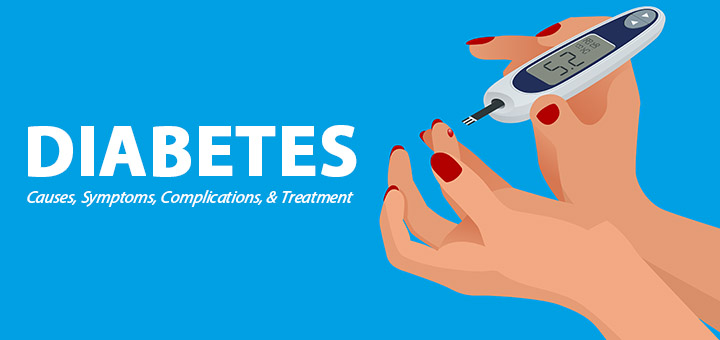What is Diabetes?
Diabetes or diabetes mellitus is defined as a disease associated with abnormally high levels of glucose or sugar in the blood. Blood glucose or sugar is converted into energy after it reaches cells. This energy helps our body to perform all functions. A hormone called insulin, produced by the pancreas helps transport glucose from our blood to our cells. Diabetes occurs when the pancreas does not produce enough or any insulin, or our body can’t use insulin properly.
Over a period of time, high blood glucose levels can cause many health problems. Diabetes is not a curable disease, but we can take certain steps to manage it and stay healthy.
What are the types of diabetes?
The most common types of diabetes are type 1, type 2, and gestational diabetes.
Type 1 diabetes
Type 1 diabetes occurs when the pancreas does not make insulin. It is also called insulin-dependent diabetes. Type 1 diabetes usually occurs in children and young adults, although it can occur at any age. People with type 1 diabetes need to take insulin every day to keep their blood glucose at an optimum level.
Type 2 diabetes
Type 2 diabetes occurs when your body does not respond appropriately to insulin. This condition is called insulin resistance. Although type 2 diabetes can occur at any age, it mostly occurs in middle-aged and older people. Type 2 is the most common type of diabetes.
Gestational diabetes
Gestational diabetes occurs in some women when they are pregnant. It usually goes away after the childbirth. Women who have had gestational diabetes have a greater chance of developing type 2 diabetes later in life.
What are the complications of diabetes?
Over a period of time, high blood glucose or sugar levels lead to following health problems:
- Heart disease
- Stroke
- Kidney disease
- Eye problems
- Dental disease
- Nerve damage
- Foot problems
What are the symptoms of diabetes?
The symptoms of type 1 diabetes can occur suddenly and can be severe. Some symptoms of type 2 diabetes are same as type 1 diabetes. In many cases, there are no symptoms, but when symptoms develop, they appear gradually. The following are the common symptoms of diabetes:
- Frequent urination.
- Increased thirst.
- Increased hunger.
- Dry mouth.
- Fatigue.
- Unintentional weight loss.
- Cuts and wounds take longer to heal.
- Blurred vision.
Other symptoms of type 2 diabetes
While the symptoms of type 2 diabetes can be the same as type 1 diabetes, there are other symptoms specific to type 2 diabetes. The following are the symptoms of type 2 diabetes:
- Slow-healing sore or cuts
- Frequent infections
- Itching of the skin in groin area
- Yeast infections
- Weight gain
- Numbness or tingling in the hands and feet
- Impotence
What are the treatments for diabetes?
Type 1 diabetes neither can be prevented nor can be cured. The main aim of treatment for diabetes is to keep blood glucose levels as normal as possible. Treatment for either type 1 diabetes or type 2 diabetes is the same involving medicines, diet, and exercise to control blood sugar level.
The first line of treatment for people with type 1 diabetes is taking insulin every day to keep their blood glucose as normal as possible.
Type 2 diabetes can be controlled or even reversed with healthy diet, lifestyle changes, losing weight, and exercise.
Diabetes Education
Diabetes is a complex disease that requires daily self-management and other measures. Every diabetic patient should learn as much as possible about best ways to manage their diabetes. Your doctor will be able to educate you about various ways to manage your diabetes.
Every diabetic patient should visit their doctor at least 3 to 4 times a year. This way, your doctor will be able to treat as well as educate you about best ways to get better control over your blood sugar, cholesterol, and blood pressure levels. Controlling them reduces your risk of diabetic complications, such as kidney disease, eye disease, nerve disease, heart attack, and stroke.
This feature is for informational purposes only and is not intended to substitute the expert guidance of a doctor. We advise seeing a doctor if you have any health concerns.

